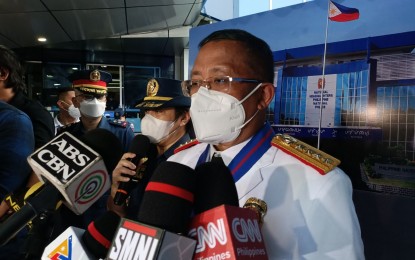
PNP chief Gen. Rodolfo Azurin Jr. (PNP photo)
MANILA – Philippine National Police (PNP) chief Gen. Rodolfo Azurin Jr. wants sanctions for vessels found to be involved in the transport of illegal drugs into the country.
Azurin made the remark as he stressed that the majority of narcotics enter the Philippines by sea.
“We need to identify ano yung mga ginagamit na mode na pag-transport so that ipatanggal natin yung kanilang license na makapasok sa bansa natin or kumpiskahin natin sila kasi hindi naman yung lalangoy na darating na lang yung droga sa atin. Sabi ko nga definitely by air and by sea and obviously ang titingnan natin dito karamihan ng pumapasok na contraband dito sa atin is galing sa dagat dahil very weak ang ating border control and security (We need to identify what modes of transportation are being used so that we can revoke their license to enter our country or confiscate them because the drugs will not come to us by just floating. Obviously these contraband enter by air or sea and what we are going to look here is that most of the contraband enter the country by sea because our border control and security is very weak),” Azurin told reporters shortly after assuming as the PNP's 28th chief in Camp Crame Wednesday night.
He said the PNP will also “liaise and partner” with other government agencies to reduce, if not totally eliminate instances where the country serves as either a market or transshipment point for illegal drugs.
Azurin vowed to strengthen partnership with the Philippine Navy, Philippine Coast Guard and the Bureau of Customs, and other government agencies to help sustain the war on drugs.
He, meanwhile, vowed to sustain the gains of the government's anti-illegal drug campaign with the support of the community.
“Ang approach is we continue yung ating programa but this time pag-aralan natin na katuwang natin ang bawat komunidad sa barangay (let's study the campaign together with each community in the barangay). I always believe that the barangay leaders, kilala nila kung sino yung mga constituents nila so kailangan (they know their constituents so what is needed is) we communicate with them and then, if there is a need for those affected by drugs in the community to undergo rehabilitation, we will do it. After all, we have drug rehabilitation facilities that are available," Azurin said.
He also directed concerned police units to come up with a more sustainable concept of operations, especially on the war on drugs, local communist terrorists, terrorism, human trafficking, kidnapping for ransom, and other crimes perpetrated by organized crime groups.
President Ferdinand Marcos Jr. earlier said drug abuse prevention and education and the improvement of rehabilitation centers will be the focus of his administration’s anti-drug campaign, as well as ensuring the conviction of high-value drug personalities.
Strengthen barangay anti-drug councils
In a related development, Interior and Local Government Secretary Benjamin Abalos Jr. urged local chief executives (LCEs) to help strengthen Barangay Anti-Drug Abuse Councils (BADACs) in their respective jurisdictions as the government looks to sustain the campaign against illegal drugs.
Speaking before governors and mayors in Cagayan de Oro City on Wednesday, Abalos stressed that the Marcos administration will continue the relentless war against illegal drugs and will focus on addressing the problems on the ground.
Abalos, who served as mayor of Mandaluyong City for three consecutive terms, emphasized the need for LCEs to help in strengthening BADACs to tackle the drug menace at the grassroots level.
“Humihingi po ako ng tulong (I'm asking for your help) about illegal drugs. We will intensify the war on drugs, and we will start at the grassroots. So please, I am requesting you to harness the capability and strengthen your BADACs,” Abalos said in a statement on Thursday.
The DILG chief said BADACs play a critical role in the whole-of-government approach in countering the proliferation of illegal drugs in the communities.
“Nanawagan tayo sa mga gobernador at mayors na siguruhin na ang ating mga BADAC ay maayos na gumagana at nakakatulong sa pagprotekta sa mga komunidad laban sa iligal na droga at mga tagapagpalaganap nito (We call on the governors and mayors to make sure that our BADACs work properly and help protect communities against illegal drugs and their distributors),” Abalos said.
BADAC is the grassroots program of the DILG aimed at organizing barangay officials and other stakeholders as the first line of defense in countering drug-related crimes in barangays.
Among its responsibilities are identifying drug-affected areas; creating the BADAC Plan of Action; equipping Barangay Tanods and BADAC Auxiliary Team on their roles and functions in the campaign against illegal drugs; assisting persons who used drugs (PWUDs) who surrendered to Barangay Rehabilitation and Referral Desk; and, monitoring individuals who are undertaking Community-Based Rehabilitation Treatment.
Abalos also assured the LCEs in Northern Mindanao that the Marcos administration is a government that listens and actively seeks consultations with local officials and various stakeholders on issues being encountered on the ground.
He noted that the DILG will keep its lines open for all LCEs to be an efficient bridge between the national and local governments. (PNA)
